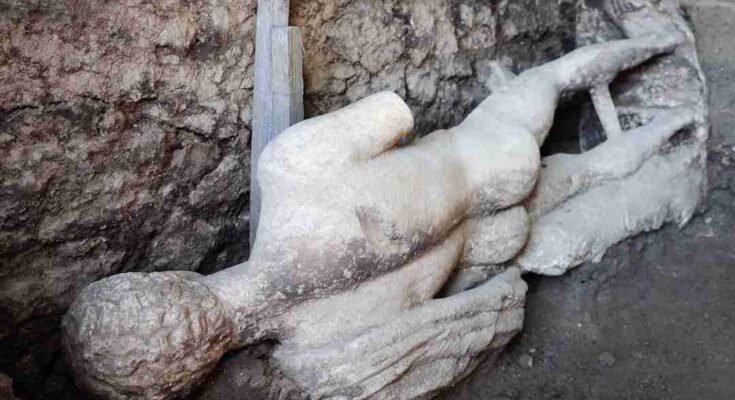Archaeologists near Bulgaria’s southeastern border with Greece uncovered a nearly 7-foot statue of the ancient Greek god Hermes during a dig this week.
The unexpected find happened during the excavation of an ancient Roman sewer in the abandoned city of Heraclea Sintica, which was founded by King Philip II of Macedon between 356 and 339 BC.

A powerful earthquake around 425 AD destroyed the majority of the city’s infrastructure, including the civic basilica, and also caused the nearby Strumeshnitsa River to flood the forum. After 457 AD, groups of people returned to live in the ruins, but life in Heraclea gradually dissipated with no indications of permanent habitation by 500 AD.
Hermes statue in Bulgaria in “very good condition”
“Its head is preserved. (It’s in a) very good condition,” lead archaeologist Lyudmil Vagalinski said, explaining that the marble statue had been placed in the sewer and covered with dirt, possibly as Christianity was adopted as the official religion of the Roman Empire and pagan symbols were banned.
He added that the statue was a Roman copy of an ancient Greek original. “Everything pagan was forbidden, and they have joined the new ideology,” Vagalinski said. He added, “but apparently they took care of their old deities.”
Since 2007 archaeological excavations have been taking place at Heraclea Sintica, led by Vagalinski, of the National Institute with Museum of Archaeology in Sofia. They noticed strange structures above it: tunnels and an arch. Later on, after geosonar examination by Russian specialists, a large studio for producing ceramic masks for an unknown and as yet unrevealed ancient theatre was discovered.
Hermes, the herald of the Greek gods

In Ancient Greek mythology, Hermes is known as the herald of the gods; he is in charge of protecting travelers, as well as thieves and liars, and he also guides souls to the underworld or Hades. For his great cunning and insight, he is also considered the god of thieves.
Initially, Hermes was a god associated with the underworld. In ancient Greece, he was worshiped as “the god of the way between the lower and upper world.” This position gradually expanded to include roads in general and then borders, travelers, sailors, and commerce.
Hermes was born to Zeus and Maya, daughter of the titan Atlas, and one of the Pleiades. The legend goes that he was born on Mount Cilene in Arcadia in a cave. However, some traditions say that his birth was on Mount Olympus itself.
The main characteristic of Hermes in Greek mythology is the role of herald, or messenger, of the gods. He was a messenger when eloquence was required due to his great ability as a speaker in achieving the desired goal; hence, the tongues of sacrificed animals were typical offerings for him.
Hermes was also the god of prudence and skill in all relationships of social exchange. He is the god of deception, of the uncertain, of what happens from one place to another, and that is why he was also responsible for taking the souls of the dead into the afterlife. Hermes was renowned for doing everything he accomplished, whatever it was, with a certain skill, dexterity, and even grace.
Related: Hermes, the God of Thieves in Ancient Greece



